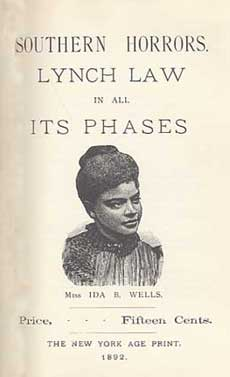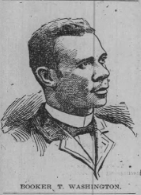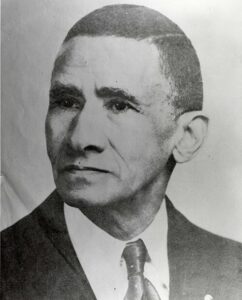Once upon a time in Black Entrepreneur History lived an African American woman called the “arch foe of of the lynching evil”1, Ida B. Wells, having devoted 38 years of her life toward the elevation and civil rights of African Americans, through fighting lynching both “in the press and the platform”1. She was also a social and church worker, teacher, lecturer, and journalist, utilizing each of these talents to fight against the misunderstood, oppressed people which were her own race.
Ida B. Wells was born in Holly Springs, Mississippi in 1862 which means that she was born into slavery, however, it was only a year later that the Emancipation Proclamation was signed and in 1865 that all enslaved in the Confederate States were made free through the abolishment of of slavery reaching every area of that part of the USA. Her parents were James and Elizabeth Wells; her father was a carpenter and her mother a housekeeper who was originally from Virginia2.
Tragedy struck when her parents and one sibling passed away of yellow fever, and on the 1880 census, the young Ida B. Wells was listed as the head of the family, over the rest of her surviving siblings. Her mother and father passed away in 18783. It was as a teen that she began teaching in her home state, and then her and her siblings moved to Memphis, Tennessee where she continued teaching at a local school , and she later went on to complete her education at Fisk University, an HBCU in Nashville, Tennessee.
After facing several racist incidents, such as being thrown off transportation and being fired for speaking out as a teacher, she became part owner and editor of a Black newspaper called Memphis Free Speech and Headlight. After a good friend was lynched, it pushed Ida into her fight against lynching in America, writing and making the nation aware of lynchings against African Americans.
Ida B. Wells Marriage
Ida B Wells married a Black Canadian man named a Ferdinand L. Barnett in 1895 at Bethel Church. Her husband was an attorney, and they all lived on Rhodes Avenue in Chicago in 1900s, expanding their family with 4 children, two sons and two daughters.
Inside the Estherville Daily News of 1895, the announcement of her marriage named her “leader of the antilynching movement in the country and England.4” Her husband was the President of the Antilynching League and he was also half owner of the second oldest Black newspaper in the USA called the Conservator3. He was also an attorney at Barnett & Williams, his own practice.
Organizations Founded & Supported by Ida B. Wells
She founded several organizations:
- the first colored woman’s club in the state of Illinois
- known as the mother of the Illinois Association of Colored Women
- founded the Negro Fellowship League
- founded the Alpha Suffrage club (which got women more active in the political process)
- backed the founding of the Wabash Avenue Branch YMCA
- supported the founding of the Frederick Douglass center (Chicago Urban League)
Ida B. Wells also worked with Jane Addams, a social worker and the first American woman to win the Nobel Peace Prize in 1931 as well as the woman who established living quarters for immigrants in Chicago, and together they were able to bring segregated schools in the city of Chicago to a halt. Not only that, Ida B. Wells protested lynching before large audiences as well as demanded an end to discrimination against African Americans when it came to federal employment.
Ida B. Wells also wrote a publication on lynchings and the lies that backed those lynchings in order to kill African Americans. The publication was called Southern Horrors: Lynch Law in All Its Phases. She gave example after example to prove her claims which were also already evident during that time to anyone who had their eyes open.


Ida B. Wells Death & Posthumous Honors
Ida B. Wells passed away on March 28, 1931 in Chicago, Cook County, Illinois and was buried in Oakwood Cemetery, noted as a social worker at her death. She passed away of kidney disease, and posthumously in the year 2020, she as awarded the Pulitzer Prize for her work against the lynching of African Americans. Her home, the Ida B. Wells House is a National Landmark.
The city honored Ida B. Wells with living projects called Ida B. Wells Homes which were built for families who were once cramped together in one room who now had separate places to live. The Ida B. Wells Homes, which were 125 buildings for 1662 families, were located on the Southside of Chicago and worth $9 million dollars, managed by an African American Howard University alumni, attorney and president of NAACP, Oscar C. Brown5.
Source:
- The Pittsburgh Courier 24 Feb 1940, Sat · Page 8
- Year: 1870; Census Place: Holly Springs Ward 2, Marshall, Mississippi; Roll: M593_740; Page: 337A
- Year: 1870; Census Place: Holly Springs Ward 2, Marshall, Mississippi; Roll: M593_740; Page: 337A
- Estherville Daily News 10 Jul 1895, Wed · Page 3
- Sunday Chicago Bee 04 Apr 1943, Sun · Page 4




More Related Stories
Isaac Scott Hathaway – Founder of Isaac Hathaway Art Company & Designer of First African American Coin
James Wormley – Founder of the Most Expensive Hotel in Washington D.C. in 1800s – the Wormley Hotel
William E. Matthews – Wealthy Financial Broker & Civil Rights Leader of 1800s